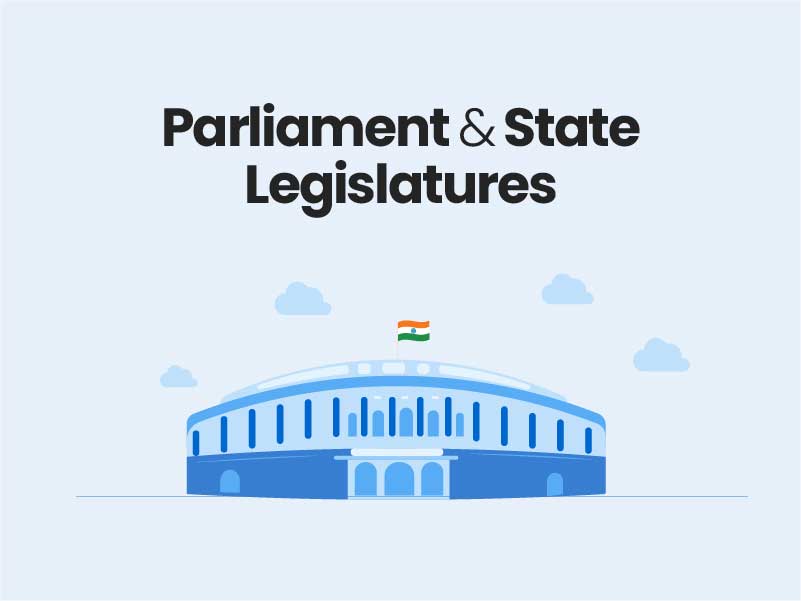Companion@360 → 7 Month programme to sharpen your writing skills → REGISTER NOW

Parliament and State Legislatures
Parliament and State Legislatures Structure, Functioning, Conduct of Business, Powers and Privileges and Issues arising out of this
Previous Year Questions
- Discuss the role of Public Accounts Committee in establishing accountability of government to the people (UPSC-2017)
- Indian Constitution has provision for holding joint session of 2 houses of Parliament. Enumerate the occasions when this would normally happen and also where the occasions when it cannot, reasons thereof (UPSC 2017)
- The ‘Powers, Privileges and Immunities of Parliament and its Members’ as envisaged in Article 105 of the Constitution leave room for a large number of un-codified and un-enumerated privileges to continue. Assess the reasons for the absence of legal codification of the ‘parliamentary privileges’. How can this problem be addressed? (UPSC 2014)
- The role of individual MPs (Members of Parliament) has diminished over the years and as a result healthy constructive debates on policy issues are not usually witnessed. How far can this be attributed to the anti-defection law, which was legislated but with a different intention? (UPSC 2013)
Index
- Structure of the Parliament
- Role of Rajya Sabha
- Role of President
- Representation of Different States
- The functioning of the parliament
- Control on Executive and Associated Issues
- Committees
- Passing of Bills
- Provision of Joint Sitting
- Amendment Procedure and associated issues
- Low Productivity of the Parliament
- Control on Executive and Associated Issues
- Powers of the Parliament
- Judicial
- Electoral
- Financial: Passing of the Budget
- Privileges and Associated Issues
Structure and Functioning of Parliament
The Parliament consists of the President, Lok Sabha and Rajya Sabha. It is the legislative body of the country and makes legislations regarding matters in Union and Concurrent List. It is also vested with the exclusive authority to amend the constitution of India.
Why Rajya Sabha?
- Federal Chamber: Rajya Sabha consists of elected representatives from state legislatures. It is conceived as a chamber to check that legislations passed by the Lok Sabha are in accordance with federal nature of administration in the country and in consonance with interest of various states
- Check hasty or ill-conceived laws: As the house of elders and of domain experts nominated persons, Rajya Sabha also checks hasty or ill-conceived laws passed by Lok Sabha
- Representation to Domain Experts: The President can nominate 12 persons who are eminent personalities in various domains to be members of Rajya Sabha. Hence the house facilitates expertise without the necessity of a direct election.
Role of President
- Check on passed legislation: President is the final authority of check before a bill becomes an act. He may withhold his assent or sent back a bill which he feels is not in the best interest of the country on behalf of the executive
- Dissolving the Lok Sabha: President may dissolve the Lok Sabha in lieu of advice tendered by Prime Minister or when no-confidence motion is passed in Lok Sabha. Thus he enforces the accountability of the government to the House of People
Read Also President Rule
Possible Question
The domicile requirement of elected representatives of Rajya Sabha was taken away. How do you think it would affect the functioning and purpose of Rajya Sabha? Critically Analyse.
Rajya Sabha as an institution of bicameralism was conceived to maintain the federal framework of the country. The members of Rajya Sabha are foremost representatives of the state rather than of any political party.
Drawbacks of the Move
- Arbitrary Use: The doing away of the domicile requirement would reduce the utility of having state-wise representation. It leaves the door open for arbitrary misuse for political motives
- Dilutes the Federal Mandate of Rajya Sabha: Domiciles would have best upheld the federal mandate of the Rajya Sabha through an equitable representation of states
- Lack of Accountability: The individual states interests at the national level would have been best represented by domiciles of that state. However, the lack of the same leads to a vacuum of accountability on the assembly that elects representatives
- Not Aware of Ground Realities: A person who is not domicile in a state may not be knowledgeable on the priorities of the state to defend them in the Council of States.
Why it is legitimate?
- Wider Talent Pool for Political Parties: The doing away of domicile requirement opens up opportunities for several candidates who may be more worthy and suited for parliamentary roles as compared to ones within the state
- Better Integration: The representation of one state by a non-domicile can facilitate emotional integration of the country and kindle the bond of oneness traversing across regional lines
- States’ Interests: Even candidates who are not residents of a state may be aware of interests and aspirations of the state and worthy enough to protect the same in the Council of States.
Conclusion
The lifting of the domicile requirement is an indication of growing partisanship in parliamentary democracies where loyalties lie first to the party than to the people of the state. Along with this concern, we can expect it to bring in a wider spectrum of more worthy parliamentarians provided political parties choose right.
